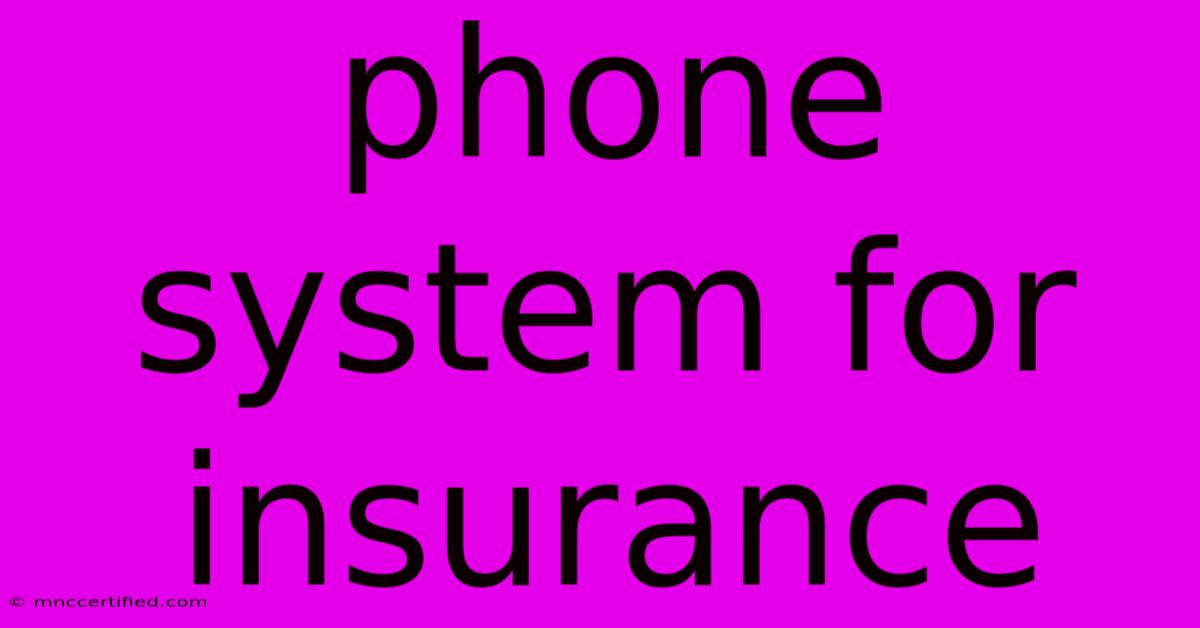Phone System For Insurance

Table of Contents
Streamlining Success: The Ultimate Guide to Phone Systems for Insurance Agencies
The insurance industry thrives on connection. Whether it's building rapport with clients, handling claims efficiently, or collaborating internally, seamless communication is paramount. Your phone system is the backbone of this communication, and choosing the right one can significantly impact your agency's efficiency, productivity, and ultimately, your bottom line. This comprehensive guide will explore the best phone systems for insurance agencies, focusing on features, cost considerations, and implementation strategies to help you find the perfect solution.
Why a Specialized Phone System Matters for Insurance
Unlike other industries, insurance agencies face unique communication challenges. Think about it:
- High call volume: You likely handle a significant number of inbound calls daily, from prospective clients to existing policyholders needing assistance.
- Complex call routing: Calls need to be directed efficiently to the right agent based on specialization (auto, home, life, etc.) or client type.
- Compliance and security: Strict regulations govern how you handle sensitive client data; your phone system must comply with these rules.
- Integration with CRM: Seamless integration with your Customer Relationship Management (CRM) system is vital for efficient data management and improved customer service.
- Disaster recovery: Maintaining communication during outages is crucial for business continuity.
A standard phone system simply won't cut it. You need a robust, flexible solution designed to handle these specific needs.
Types of Phone Systems for Insurance Agencies
Several options exist, each with its own advantages and disadvantages:
1. Cloud-Based Phone Systems (VoIP)
Advantages:
- Scalability: Easily add or remove users as your agency grows.
- Cost-effective: Often more affordable than traditional systems, with lower upfront costs and predictable monthly fees.
- Accessibility: Access calls and features from anywhere with an internet connection.
- Advanced features: Includes features like call recording, voicemail-to-email, auto-attendants, and integration with CRM platforms like Salesforce and HubSpot.
- Disaster recovery: Data is often stored in multiple locations, ensuring business continuity.
Disadvantages:
- Internet dependency: Requires a reliable internet connection.
- Security concerns: Requires robust security measures to protect sensitive data.
2. On-Premise Phone Systems (Traditional PBX)
Advantages:
- Control: You have complete control over your system's hardware and software.
- Predictable costs (potentially): Once the initial investment is made, ongoing costs are often lower than cloud-based systems (excluding maintenance).
Disadvantages:
- High upfront costs: Significant initial investment in hardware and installation.
- Limited scalability: Difficult and expensive to expand the system.
- Maintenance: Requires ongoing maintenance and IT support.
- Lack of flexibility: Features are often limited compared to cloud-based options.
3. Hybrid Phone Systems
Advantages:
- Flexibility: Combines the benefits of both cloud-based and on-premise systems.
- Scalability: Allows for gradual expansion as needed.
Disadvantages:
- Complexity: Can be more complex to manage than either cloud or on-premise systems alone.
- Cost: Can be more expensive than either option alone.
Key Features to Look For
When choosing a phone system, prioritize these essential features:
- Call routing and queuing: Efficiently manage call flow and minimize wait times.
- IVR (Interactive Voice Response): Guide callers to the appropriate department or agent.
- Call recording: For compliance, training, and quality assurance.
- CRM integration: Seamlessly integrate with your CRM for efficient data management.
- Call analytics and reporting: Track key metrics to improve performance.
- Mobile access: Allow agents to access calls and features from their mobile devices.
- Disaster recovery: Ensure business continuity in case of outages.
- Compliance features: Adhere to industry regulations (HIPAA, GDPR, etc.).
Choosing the Right Phone System for Your Insurance Agency
The best phone system for your agency depends on factors such as:
- Budget: Consider both upfront and ongoing costs.
- Size of your agency: A smaller agency might find a cloud-based system sufficient, while a larger agency may need a more robust solution.
- Technical expertise: Consider your internal IT capabilities and support needs.
- Future growth: Choose a system that can scale with your agency's growth.
Implementing Your New Phone System
Careful planning is crucial for a smooth implementation. Consider these steps:
- Needs assessment: Clearly define your agency's communication needs.
- Vendor selection: Research and compare different vendors and their offerings.
- Training: Ensure your staff is properly trained on the new system.
- Integration: Seamlessly integrate the system with your existing CRM and other software.
- Testing: Thoroughly test the system before going live.
By carefully considering your needs and choosing the right phone system, your insurance agency can enhance communication, improve efficiency, and ultimately, better serve your clients. The right investment in technology translates to a stronger bottom line and a more satisfied customer base.

Thank you for visiting our website wich cover about Phone System For Insurance. We hope the information provided has been useful to you. Feel free to contact us if you have any questions or need further assistance. See you next time and dont miss to bookmark.
Featured Posts
-
Swifts Eras Tour Breaks 2 B Record
Dec 10, 2024
-
Trump Names Nj Woman Counselor
Dec 10, 2024
-
Child Rape Allegation Against Jay Z
Dec 10, 2024
-
Neely Case Verdict Fathers Statement
Dec 10, 2024
-
Auto Insurance Sedalia Mo
Dec 10, 2024